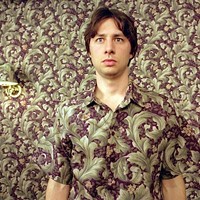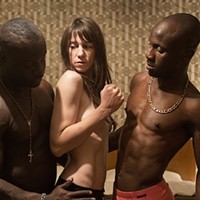(View From The Couch is a weekly column that reviews what's new on Blu-ray and DVD.)
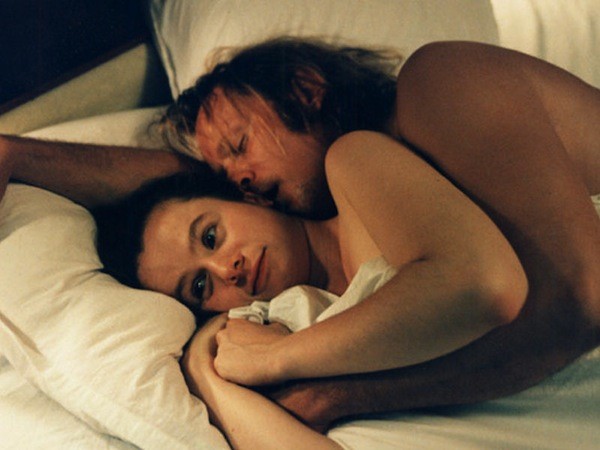
-
Emily Watson and Stellan Skarsgård in Breaking the Waves (Photo: Criterion Collection)
BREAKING THE WAVES (1996). Issues of faith, devotion, sexuality and divine intervention are at the center of this daring and provocative piece that placed writer-director Lars von Trier on the international map. In a role originally intended for Helena Bonham Carter, Emily Watson delivers a staggering performance as Bess, a naive and deeply religious Scottish woman who discovers the pleasures of sex and love upon marrying a hunky oil-rig worker named Jan (Stellan Skarsgård). But after an accident leaves Jan paralyzed from the neck down, he urges Bess to take a series of lovers and tell him about her experiences; she reluctantly agrees, only to come to believe that her actions are actually helping to restore her husband's health. In a cinematic universe that too often fails to acknowledge the omniscience and influence of genuine religious conviction on the real world, von Trier has fashioned a challenging drama that asks us to contemplate the true nature of humankind's relationship with God and how the definition of sin isn't always clear-cut. The film's startling frankness and leisurely pace (it runs 159 minutes) will put off many viewers, but it would be a shame for anyone to miss Watson's extraordinary work. In addition to earning a Best Actress Oscar nomination for Watson, this also nabbed New York Film Critics Circle awards for Best Actress, Director and Cinematography (Robby Müller); the National Society of Film Critics went even further, handing it those three awards as well as naming it Best Film.
Blu-ray extras include select-scene audio commentary by von Trier, editor Anders Refn and location scout Anthony Dod Mantle; deleted and extended scenes; new interviews with Watson and Skarsgård; Watson's audition tape; and a promotional clip from the Cannes Film Festival (where the movie won the Grand Jury Prize).
Movie: ***1/2
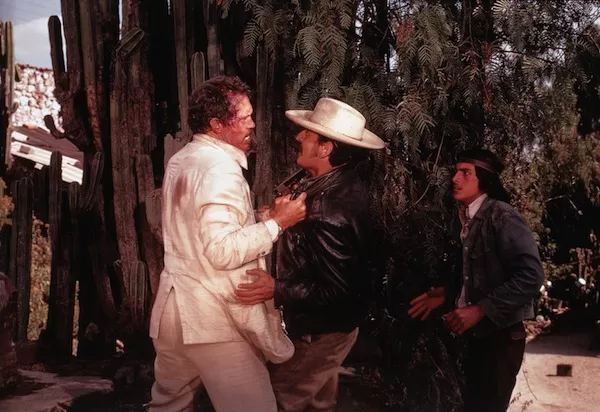
-
Warren Oates (left) in Bring Me the Head of Alfredo Garcia (Photo: Twilight Time)
BRING ME THE HEAD OF ALFREDO GARCIA (1974). While this Sam Peckinpah effort may register with many as a typical burst of nihilism from the maverick writer-director, it's actually the only film on which he had total creative control, with no studio interference whatsoever. As such, it's distinguished by some truly original moments but also marred by a ramshackle narrative that leans a bit too heavily on regurgitated themes and stylistic flourishes. Character actor Warren Oates essays a rare leading-man part here — he's cast as Bennie, an ex-pat American living in boozy withdrawal in Mexico. A local bigwig (Emilio Fernandez) offers a million dollars to the person who brings back evidence that Alfredo Garcia, the man who impregnated his daughter, is dead; acting as middle men, a group of sleazy American operatives bamboozle Bennie into tracking down Alfredo for a mere fraction of the reward money. Thanks to his lover, a prostitute named Elita (Isela Vega), Bennie knows that Alfredo has been killed in a car accident, but he soon learns that the fact that the Casanova is already a corpse won't make the job any easier. Out of the expected maelstrom of machismo and misogyny emerges a surprisingly affecting romance between Bennie and Elita, although much of the violence feels rather rote. Gig Young and Robert Webber are aptly menacing as a pair of gay assassins (appearing on the scene three years after Diamonds Are Forever's Mr. Kidd and Mr. Wint), while Kris Kristofferson, star of Peckinpah's 1973 Pat Garrett & Billy the Kid, pops up as a biker who terrorizes Bennie and Elita.
Blu-ray extras include audio commentary by co-scripter Gordon T. Dawson and film historian Nick Redman; separate audio commentary by film historians Redman, Paul Seydor, Garner Simmons and David Weddle; a making-of featurette; an isolated track of Jerry Fielding's score; and a superb photo gallery featuring many international posters.
Movie: **1/2
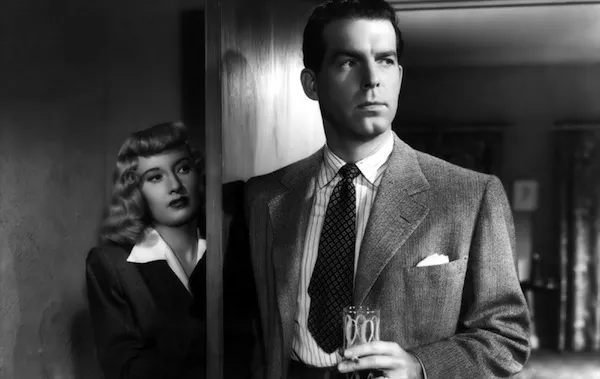
-
Barbara Stanwyck and Fred MacMurray in Double Indemnity (Photo: Universal)
DOUBLE INDEMNITY (1944). Quite possibly the most perfect example of film noir to emerge from Hollywood during that genre's reign, Double Indemnity was yet one more masterpiece that Billy Wilder would helm during an extraordinary career that also made room for Sunset Boulevard, Some Like It Hot and The Apartment (among numerous others). A bored housewife (Barbara Stanwyck) talks a flirtatious insurance salesman (Fred MacMurray) into helping her bump off her husband; all goes according to plan until the salesman's shrewd boss (Edward G. Robinson) begins to smell a scam. Adapted from James M. Cain's novel (with a script by Wilder and Raymond Chandler), this genuine classic is stylish, sexy and suspenseful, with incredible dialogue that's simply to die for. MacMurray and Stanwyck have never been better, although it's Robinson who steals the show as a self-congratulatory sort who never suspects that his favorite employee has turned the corner. An influence on countless thrillers to follow (Lawrence Kasdan's Body Heat is a direct descendant), this earned seven Academy Award nominations, including bids for Best Picture, Director, Screenplay and Actress (the two male actors were gypped).
Blu-ray extras include audio commentary by film historian Richard Schickel; a separate audio commentary by screenwriter Lem Dobbs (Haywire) and film historian Nick Redman; a making-of featurette; an introduction by Turner Classic Movies host Robert Osborne; and the 1973 TV-movie version starring Richard Crenna, Samantha Eggar and Lee J. Cobb. The Blu-ray also contains poster and lobby card reproductions as well as a still from the alternate ending.
Movie: ****
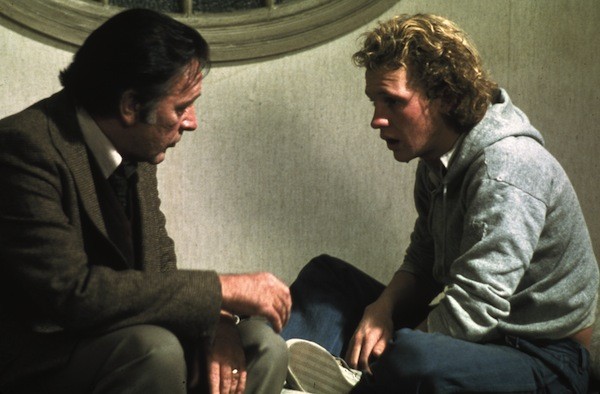
-
Richard Burton and Peter Firth in Equus (Photo: Twilight Time)
EQUUS (1977). The rumor goes that when Sylvester Stallone started to say "Richard..." at the 50th Academy Awards ceremony, Richard Burton started to rise from his seat, assuming he had won Best Actor for Equus. Instead, he had to quickly slink back down, since the winner turned out to be another Richard: Richard Dreyfuss for The Goodbye Girl. This is utter nonsense, as can be confirmed by a quick YouTube search; had it been true, though, who could blame Burton for thinking the trophy was his, given the high caliber of his performance? One of several stars to play the part of Martin Dysart on the stage (Anthony Hopkins and Anthony Perkins were among the others), Burton proved he was up for the cinematic adaptation, delivering a formidable performance as a psychiatrist whose latest patient is a teenage lad named Alan Strang (Peter Firth, also imported from the stage). Strang has been placed in a psychiatric hospital for committing a horrific crime — he blinded several horses — and Dysart works to unravel the reasons behind the youth's shocking act. A Tony Award winner for Best Play, Equus met with less enthusiasm on the silver screen — even with Peter Shaffer adapting his own work and the direction in the capable hands of Sidney Lumet (Dog Day Afternoon, Network), the film was criticized for stripping the work of its theatricality (mainly, the horse constructions and costumes were replaced on film by real animals; see also War Horse). Yet Lumet's handling of the material doesn't miss a beat; the only real trace of an encroaching staginess can be found in some of Dysart's lengthy monologues. In addition to Burton's bid, the movie also earned Oscar nominations for Best Supporting Actor (Firth) and Best Adapted Screenplay.
Blu-ray extras include audio commentary by film historians Julie Kirgo and Nick Redman; the two-hour documentary In from the Cold?: The World of Richard Burton; an isolated track of Richard Rodney Bennett's score; and the theatrical trailer.
Movie: ***

-
Frances McDormand in Fargo (Photo: MGM & Fox)
FARGO (1996). For the uninitiated, this modern classic from Joel and Ethan Coen stars Frances McDormand as Marge Gunderson, a pregnant police chief who tries to locate the men responsible for a triple homicide just outside her town of Brainerd, Minnesota; William H. Macy co-stars as Jerry Lundegaard, a weasely car salesman who hires two thugs (Steve Buscemi and Peter Stormare) to kidnap his own wife (Kristin Rudrud). Watching these two plotlines mingle is just one of the many pleasures of Fargo, a movie so unique that its cleverness even extends to its title (only one scene — the first one — actually takes place in Fargo). The performances by McDormand (bringing a great screen character to life) and Macy are superb, and Harve Presnell contributes a forceful turn as the wealthy Wade Gustafson, who can barely disguise his contempt for his weakling son-in-law Jerry. The cinematography by Roger Deakins (who's been Oscar-nominated a whopping 11 times and has yet to win) is likewise excellent, as is the music score by Carter Burwell. Nominated for seven Academy Awards, including Best Picture, Best Supporting Actor (Macy, who should have won) and Best Cinematography, this earned Oscars for Best Actress and Best Original Screenplay (both Coens).
Blu-ray extras include audio commentary by Deakins; a making-of featurette; a trivia track; an article reproduced from the magazine American Cinematographer; and a photo gallery.
Movie: ****
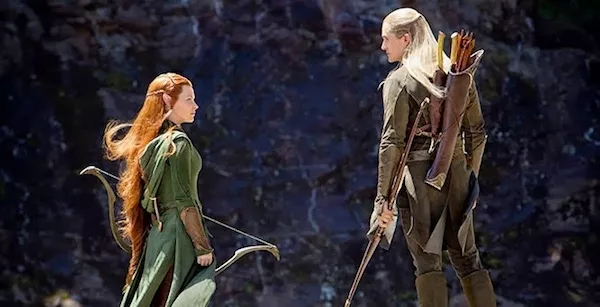
-
Evangeline Lilly and Orlando Bloom in The Hobbit: The Desolation of Smaug (Photo: Warner Bros.)
THE HOBBIT: THE DESOLATION OF SMAUG (2013). Picking up where The Hobbit: An Unexpected Journey ended, this middle chapter in the J.R.R. Tolkien saga (The Hobbit: There and Back Again will be released this December) finds hobbit Bilbo Baggins (Martin Freeman) and the wizard Gandalf the Grey (Ian McKellen) still accompanying 13 Dwarves of various shapes and largely same sizes as they travel to reclaim their kingdom of Eredor from the slumbering dragon Smaug. As before, they're being pursued by a pack of savage Orcs who want them all dead. More complicated is the band's relationship to the Elves they encounter; the two groups dislike each other, but seeing as they hate Orcs more, they briefly find themselves fighting on the same side. The travelers also meet a human in the form of Bard (Luke Evans), although they're not sure if he can be trusted. The Hobbit Part Deux flows more gracefully than its predecessor, but since this saga is bereft of the gravitas of the original Lord of the Rings trilogy, I was satiated after two hours. But around that mark, we're just getting the money shots of Smaug, so the film unwinds for another 40 or so minutes. Diehard fans will love every CGI second of it, but those not quite as enthralled with all the climactic bombast may find themselves eyeing the fast-forward button on the remote. The primary cast newcomers, Evans and Evangeline Lilly (as the Elf Tauriel), smoothly integrate themselves into Jackson's fantasy vision, although the return of Orlando Bloom as Legolas isn't the thrill many might be expecting. As for McKellen, his performance at this point (five films and counting) is as comforting as hot chocolate on Christmas Day. It's impossible to imagine anyone else in this role, which is why it's particularly amusing to note that the filmmakers also pursued Sean Connery for the part. "And you are...?" asks a Hobbit sitting at the bar. Coolly smoking his pipe, he replies, "Grey. Gandalf the Grey."
Blu-ray extras include a behind-the-scenes tour with director Peter Jackson; production videos; and a look at the New Zealand shooting locations.
Movie: ***
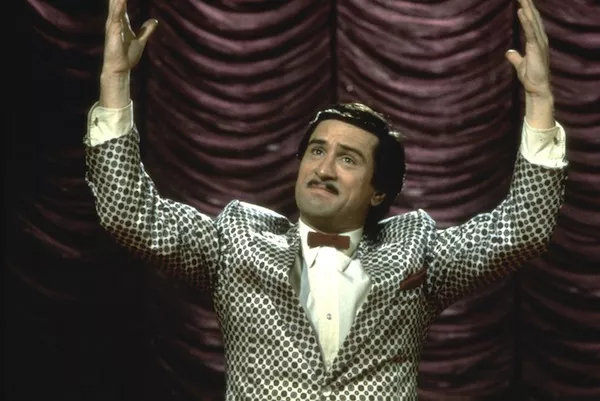
-
Robert De Niro in The King of Comedy (Photo: Fox)
THE KING OF COMEDY (1983). Perhaps the biggest box office bomb of Martin Scorsese's career — even the critically savaged New York, New York and the all but forgotten Bringing Out the Dead grossed more — The King of Comedy was dismissed in 1983 but has since emerged as a cult item that seems more relevant with every passing day. Robert De Niro delivers one of his defining performances as Rupert Pupkin, a major-league dweeb who dreams of becoming as successful a comedian as his hero, talk-show host Jerry Langford (Jerry Lewis in a role turned down by Johnny Carson). Rupert finally gets to meet his idol but repeatedly makes such a pest of himself that he becomes persona non grata; undaunted, he cooks up a scheme with a fellow fan (Sandra Bernhard) who's even more psychotic. This jet-black comedy is a symphony of unease, as the actions of its extreme characters lead to plenty of seat-squirming on the part of its viewers. Yet it's a fascinating exercise about the perils of celebrityhood and the allure of fame, and De Niro, Lewis and Bernhard are all mesmerizing. That's former Charlie's Angels star Shelley Hack as Langford's assistant, and look for The Clash's Joe Strummer, Mick Jones and Paul Simonon as a trio of derelicts.
Blu-ray extras include a making-of featurette; deleted and extended scenes (including one with Liza Minnelli); and a conversation with Scorsese, De Niro and Lewis at the Tribeca Film Festival.
Movie: ***1/2
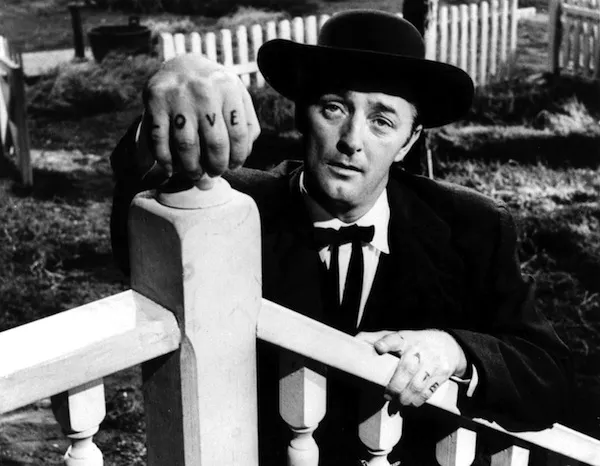
-
Robert Mitchum in The Night of the Hunter (Photo: Criterion Collection)
THE NIGHT OF THE HUNTER (1955). This is it, folks, the one that includes a character with the words "LOVE" and "HATE" tattooed on his fingers. That would be Preacher Harry Powell, portrayed by Robert Mitchum in the finest performance he would ever deliver. Powell is both a murderer and a misogynist, which leads him to kill lonely widows for their money — in the name of God, of course. After a brief incarceration (for stealing a car) that places him in the same cell with a bank robber (Peter Graves) facing execution, he decides to ingratiate himself to the crook's widow (Shelley Winters) and children (Billy Chapin and Sally Jane Bruce) in the hopes of locating the missing bank money. The kids know its location but aren't talking; this leads Powell to take some drastic measures and lands the children in the arms of a benevolent woman (Lillian Gish) who understands that "it's a hard world for little things." Actor Charles Laughton's only stint as director is an atmospheric yarn full of striking imagery by cinematographer Stanley Cortez and knowing dialogue by James Agee (adapting Davis Grubbs' novel) — a unique blend of fractured fairy tale, Southern gothic grisliness and striking German expressionism, it also has some pitch-black humor thrown in for good measure. A flop when released, it's only grown in stature and influence over the ensuing years — for starters, Spike Lee would pay homage to Powell's tattooed knuckles via the character of Radio Raheem in Do the Right Thing.
Blu-ray extras include audio commentary by second-unit director Terry Sanders, film critic F.X. Feeney, film archivist Robert Gitt and author Preston Neal Jones (Heaven and Hell to Play With: The Filming of The Night of the Hunter); a making-of featurette; an interview with actor and author Simon Callow (Charles Laughton: A Difficult Actor); a clip from The Ed Sullivan Show in which cast members perform a deleted scene; and the 2-1/2-hour work Charles Laughton Directs The Night of the Hunter.
Movie: ****

-
Charlton Heston and Orson Welles in Touch of Evil (Photo: Universal)
TOUCH OF EVIL (1958). A genuine masterpiece of cinema, Orson Welles' Touch of Evil opens with one of the longest (and most celebrated) tracking shots in film history: a crossing at the Mexican-American border, culminating with the detonation of a car bomb. Thus the groundwork is set for this fascinating and frequently lurid thriller in which Mike Vargas (Charlton Heston), an honest Mexican narcotics agent, butts heads with Hank Quinlan (Welles), a corrupt American cop, while unwittingly leaving his wife Susan (Janet Leigh) at the mercy of the lowlife inhabitants of a decrepit bordertown. A shrewd look at issues of morality, loyalty and casual racism, this dazzling cinematic achievement has the rare good fortune of being one of those films that somehow seems to improve with each subsequent viewing — the highest compliment indeed, given that it only takes one showing to evaluate its substantial worth. Welles' performance as the portly Quinlan is a stunning tour de force, with the actor-director enhancing the character's moral decay by working under extra padding and a false nose — film scholar Danny Peary once wrote that Quinlan "looks like something the cat refused to drag in," as perfect a description as can be imagined.
The Blu-ray contains three versions of the film: the original theatrical print, a preview version that was created prior to the theatrical take, and the 1998 restored version, which is called the "definitive cut" since it was constructed based on Welles' 58-page memo in which he detailed his preferences to the studio (which had taken the picture out of his hands and imposed their own changes). The set also includes a reproduction of that memo. Other extras include separate audio commentary for each cut of the film (participants include Heston, Leigh, restoration producer Rick Schmidlin and Welles historian Jonathan Rosenbaum); a 20-minute retrospective piece; and a behind-the-scenes look at the restoration.
Movie: ****



